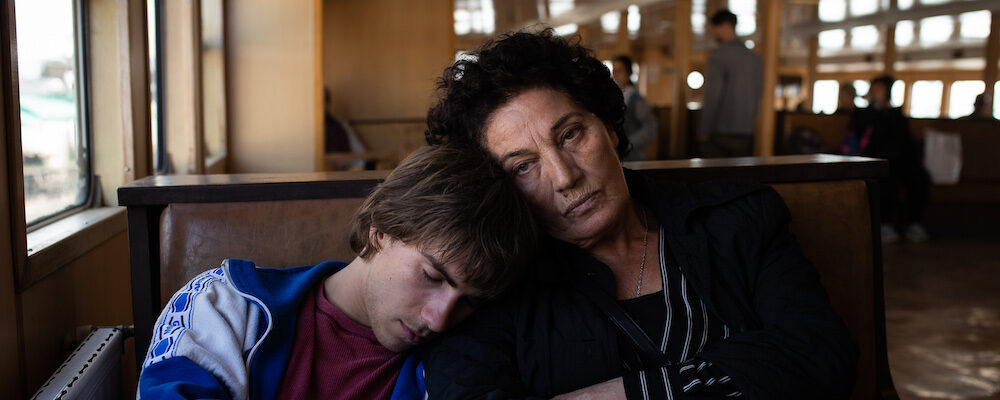Levin Akin’s ‘Crossing’ Follows a Moving Tale of Family and Borders Into Istanbul’s Trans Community
Alci Rengifo
A journey can begin with a singular purpose and become a piercing experience of intimate reflection. Levin Akin’s “Crossing” becomes such a journey with an almost masterful subtlety. Its characters embark on a search that symbolizes so much of what defines contemporary life. Borders, fears, old prejudices, the haunting sense of bad choices, and more encompass a story deceptively simple on the surface. A starting off point for the story is also Georgia and Turkey’s trans communities, who face violent prejudices that force a particular kind of migration. We impose borders on each other in the same way we do to nations.
Akin opens the story in Batumi, a desolate Black Sea city in Georgia. Lia (Mzia Arabuli), a retired school teacher, is preparing to cross the border into Istanbul to find her niece, Tekla, a trans woman who has gone missing. Lia’s sister has died and she vowed to take care of Tekla. A young Georgian, Achi (Lucas Kankava), hustles his way into crossing over with Lia. It’s not difficult to understand why. Home for Achi consists of a bullying older brother and poverty. He hopes to get a job in the big Turkish city. His method is risky by claiming to have known Tekla and having a possible address. When they arrive, they find a rusty hostel for shelter and few answers. Meanwhile, a trans woman named Evrim (Deniz Dumanli) is close to finishing her law degree while working for a nonprofit organization. While maneuvering the condescending atmosphere she has to work in, she finds a way to overcome her own barriers.
A film like “Crossing” is all about the characters. Akin’s screenplay is about what the journey does to them. They are each restless in their own way. Lia, wonderfully played by a great Mzia Arabuli, is always stern and cutting with her remarks, at times annoyed with Achi’s immaturity. Gradually it becomes clear she’s lonely and an alcoholic. There is also a lingering, hidden guilt because Lia knows Tekla left because of her family’s shame over her identity. Achi, also memorably played by Lucas Kankava, is himself seeking identity but in the sense of being tired of living in limbo. Istanbul promises some stability if he can find a job, any job. Everyone is hiding their true selves. Achi’s claims about his connections to Tekla and his family are fiction. It takes a night of too much drinking for Lia to reveal her own sorrow at having once been a great beauty chased by all the men. A kind Georgian business owner buys the pair dinner in Istanbul and clearly likes Lia, but when he sees her true state after a few drinks, the chance is lost. We go through such moments and can’t turn the clock back.
Akin’s other main subject is trans life in this corner of the world. One gets the sense that in more cosmopolitan Istanbul, trans people have been able to form their own communities and work freely in the professional world. Prejudice is more visible in the way the cops scoff at Evrim. There is also a grittier side in the sex trade corners of the city, where we soon learn Tekla might have well disappeared into. Evrim is surprised when a taxi driver offers her a ride because he genuinely likes her, not because he thinks she’s probably a sex worker. Akin here shows how human stories truly develop outside of the Hollywood mainstream. The taxi driver angle never becomes melodramatic. Evrim has genuinely met someone who seems decent, in a world where someone like her tends to be kicked out of the house. Most of her friends share the same experience of bringing shame to their families.
“Crossing” never becomes predictable and forms delicate story connections, as with two siblings who live on the streets and get by begging, singing or offering to help foreigners with addresses. They will form an elegantly subtle way of introducing Evrim to Achi and Lia, in the way we meet people by chance in life. The ending then becomes an emotionally shattering confession, capturing Lia’s hopes with a moment of self-reflection in a monologue that is truly heartbreaking. A constant theme is how Turkey and Georgia share borders, yet the people might only know bits and pieces of their neighbor’s language. Achi and Lia get by through lingual scraps, unless that global imperial language of English is used. In that same way, Lia realizes no one bothered to understand Tekla, and now she’s gone and the wandering aunt clings to hopes of redemption. Achi also realizes Georgia may be where he was born, but not where he wants to be. We have to cross borders and boundaries to find ourselves. This is a special drama about taking such a step with all the painful growth it entails.
“Crossing” releases July 19 in select theaters.

